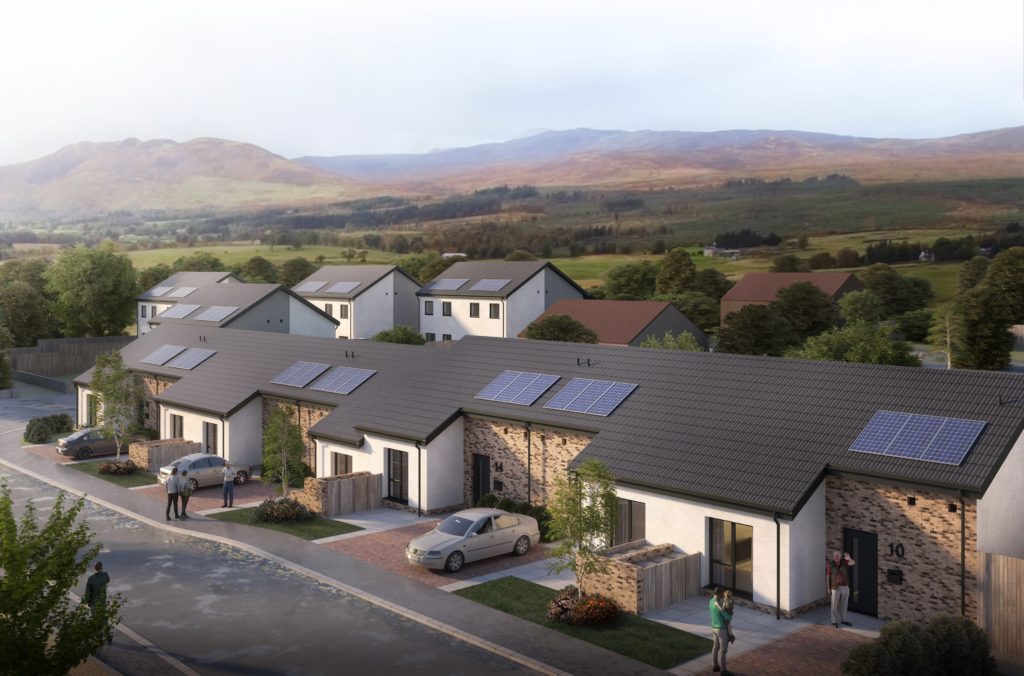Sector - Housing
Hanover Starts Green Housing
22 Mar 21

Hanover (Scotland) has received planning permission from Loch Lomond and the Trossachs National Park for its first social housing development to be built to Passivhaus standards.
The development in Drymen, at Conic Way and Montrose Way, will comprise 15 affordable homes, replacing the original Drymen housing which was the first development Hanover (Scotland) owned when it became independent in 1979.
The site has since been demolished to be replaced by the new Passivhaus projects. Existing Drymen residents will move into the new development once it is completed.
Buildings which are built to Passivhaus standards use up to 90% less energy for heating and cooling than conventional building stock, and have been identified as a key strategy for tackling fuel poverty. They also help future-proof occupants from increasingly unexpected weather patterns.
Julie McKinnon, Project Manager at Hanover (Scotland), said: “Hanover is delighted that approval has been granted for the development at Drymen.
“Drymen marks the first Passivhaus development for Hanover, and we are proud to be among the first social housing organisations in Scotland to be achieving this important environmental standard.
“The Drymen site has special significance for us given that it was Hanover’s first development when we became independent in 1979.
“We thank all development partners and contractors for their vision and expertise.”
Hanover joins Orkney Housing Association, West of Scotland Housing Association, Eildon Housing Association, Nith Valley LEAF Trust (NVLT) and Argyll Community Housing Association as one of the first housing associations in Scotland to implement Passivhaus standards in their social and affordable housing.
The development in Drymen will feature a mix of terraced bungalows for retuning residents and two-storey semi-detached residences for general needs housing. Design features and benefits will include optimal solar orientation, thermal comfort, excellent indoor air quality and wildflower meadow grass for increased biodiversity.
Hanover’s development partners and contactors include ECD Architects, Cruden Building & Renewals and TCS Construction Consultants.
Jennifer Rooney of ECD Architects commented: “By adopting the Passivhaus standard we are ensuring that we are protecting residents from rising fuel costs. In particular, it’s great to know that the amenity houses will be offered up to returning residents who previously lived at this address.
“These residents will be returning to a brand-new house, designed specifically as amenity housing, and with very low energy bills yet excellent levels of thermal comfort.”
Gordon Lee from Cruden Building & Renewals Ltd remarked: “Cruden are delighted to be involved in the construction of this milestone development for Hanover. We recognise that fuel costs are of particular concern, especially in the current climate, and the project will provide the residents with highly insulated, energy-efficient dwellings resulting in reduced energy bills.
“Cruden will also work closely with Hanover to identify potential community benefit initiatives within the local area.”
If you would like to read more stories like this, then please click here
More Housing News
- Major regeneration in Feltham
15 Oct 25
A major regeneration project in Feltham, west London, is set to unlock one of the
- Improving water efficiency and unblocking homes
7 Oct 25
Consultation launched aimed at improving water efficiency in new homes
- Build, baby, build!
30 Sep 25
I want us to build, baby, build, so we can put the key to a
-
Sector Press Releases
- Countdown to UK Infrastructure Show 2020
With less than six months to go to the UK's premier infrastructure show and networking event: UKIS 2020,
- Steady as she goes
The Vinden Partneship reacts to IHS Markit/CIPS UK Construction PMI® figures for December.
- Confidence suffers as activity stalls
The Vinden Partnership reacts to October's figures.
- Construction output drops, but market remains confident
Martin Bennett reacts to the latest ONS construction output statistics.
- Reaction to latest construction PMI statistics
Vinden reaction to IHS Markit/CIPS UK Construction PMI.
- Vinden Partnership launch Defect Detection Service
Offering independent assistance in identifying defects and advice on their resolution.
-
Sector Case Studies
- Wood is Good: Timber Framing and Sustainable Construction
Phantom considers the significance of sustainable construction.
- Insurance Backed Building Guarantees: The lights are on but is anybody at home?
Peter Vinden discusses insurance backed building guarantees and their use.
- Secured by Design – working with care homes across the UK
Secured by Design (SBD), the national police crime prevention initiative, has been a staunch campaigner
- Is Going Green a Distant Dream?
Housing accounts for almost one third of all CO2 emissions from the UK, from the
- The Villas at Turquoise Banks
XS CAD created 3D photorealistic rendered images using Autodesk 3DS Max and Adobe Photoshop.
- Tuffin Ferraby Taylor
Tuffin Ferraby Taylor turned to Acrypol Products Limited to repair their asphalt roof.






